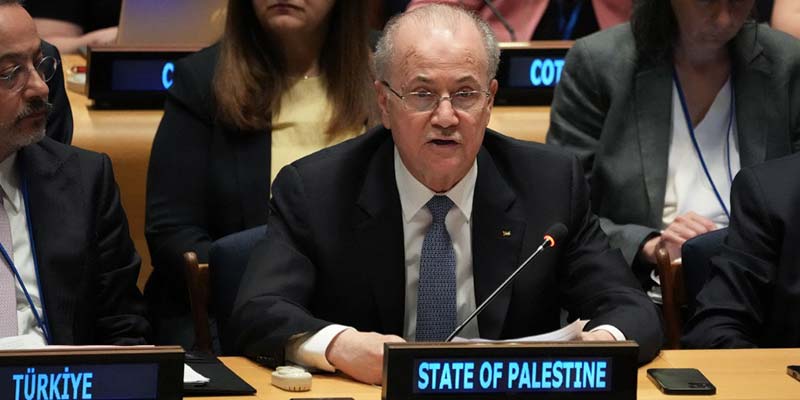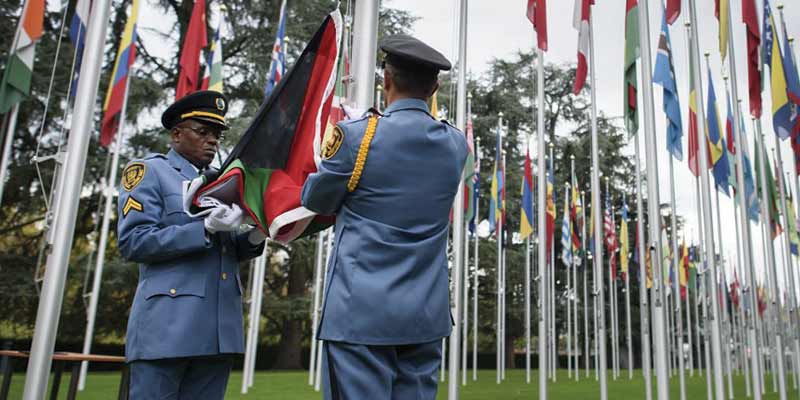- World
- Jul 31
What is two-State solution to Israel-Palestinian conflict?
• India told a high-level UN conference that global efforts must now focus on achieving a two-State solution to the Israel-Palestinian conflict through purposeful dialogue and diplomacy.
• A world in which a sovereign State of Palestine and Israel co-exist peacefully seems a distant prospect, particularly in light of the October 7,023 attacks by Hamas on Israel and the subsequent Israeli bombardment of Gaza.
• With Gaza in ruins and the two-State solution in jeopardy, delegates convened at the United Nations to jumpstart political momentum toward ending the Israeli-Palestinian conflict.
• ‘The High-level International Conference for the Peaceful Settlement of the Question of Palestine and the Implementation of the Two-State Solution’ took place in New York from July 28 to 30.
• The United States and Israel did not participate in the conference.
• France and Saudi Arabia, co-chairs of the conference, called on all UN Member States to support a declaration urging collective action to end the war in Gaza and to achieve a just, peaceful and lasting settlement of the Israeli-Palestinian conflict.
• Over the three days, more than 125 speakers took the floor during the general debate, including high-level representatives from across the globe and major regional and international organisations such as the Organization of Islamic Cooperation (OIC) and the International Committee of the Red Cross (ICRC).
• Delegates underscored the urgency of concrete steps to realise a two-State solution, highlighting the need to empower and reform the Palestinian Authority, reconstruct Gaza and ensure accountability for violations of international law.
• A 25-page outcome document titled ‘New York Declaration on the Peaceful Settlement of the Question of Palestine and the Implementation of the Two-State Solution’ asserted that the war in Gaza must end now and Hamas must free all hostages.
• In the context of ending the war in Gaza, Hamas must end its rule in Gaza and hand over its weapons to the Palestinian Authority, the outcome document said.
• It added that following a ceasefire, a transitional administrative committee must be immediately established to operate in Gaza under the umbrella of the Palestinian Authority.
Israel-Palestine conflict
• Politics, history and religion all place Jerusalem at the centre of the broader Israel-Palestine conflict.
• The status of Jerusalem is one of the biggest obstacles to reaching a peace agreement between Israel and the Palestinians.
• Israel considers Jerusalem its eternal and indivisible capital and wants all embassies based there. Palestinians want the capital of an independent state of theirs to be in the city’s eastern sector, which Israel captured in the 1967 Middle East war and annexed in a move never recognised internationally.
• Violence in the Israeli-Palestinian conflict has intensified since the new government of veteran Prime Minister Benjamin Netanyahu took power in December 2022.
• Israeli-Palestinian violence has surged with frequent military West Bank raids amid a spate of Palestinian street attacks.
• The US-brokered peace talks aimed at establishing a Palestinian state in the West Bank, East Jerusalem and Gaza territories Israel captured in a 1967 war have stalled and show no sign of revival.
What is the two-State solution?
• The idea of establishing one nation each for Jewish and Palestinian populations, living alongside each other in peace, predates the UN’s founding in 1945.
• Drafted and redrafted since then, the concept appears in dozens of UN Security Council resolutions, multiple peace talks and in the General Assembly’s recently resumed tenth emergency special session.
• In 1947, Great Britain relinquished its mandate over Palestine and brought the ‘Palestinian Question’ to the United Nations, which accepted the responsibility of finding a just solution for the Palestine issue.
• The United Nations proposed the partitioning of Palestine into two independent states, one Palestinian Arab and the other Jewish, with Jerusalem internationalised, acting as a framework for the two-State solution.
• A Peace conference was convened in Madrid in 1991, with the aim of achieving a peaceful settlement through direct negotiations along two tracks: between Israel and the Arab States and between Israel and the Palestinians, based on Security Council resolutions.
• In 1993, Israeli Prime Minister Yitzhak Rabin and the Chairman of the Palestine Liberation Organisation Yasser Arafat signed the Oslo Accord, which outlined principles for further negotiations and laid the foundation for a Palestinian interim self-government in the West Bank and Gaza.
• The 1993 Oslo Accord deferred certain issues to subsequent permanent status negotiations, which were held in 2000 at Camp David and in 2001 in Taba, but proved inconclusive.
• Three decades on from the Oslo Accord, the overarching goal of the UN remains supporting Palestinians and Israelis to resolve the conflict and end the occupation in line with relevant UN resolutions, international law and bilateral agreements in pursuit of achieving the vision of two States — Israel and an independent, democratic, contiguous, viable and sovereign Palestinian State — living side by side in peace and security within secure and recognised borders, on the basis of the pre-1967 lines, with Jerusalem as the capital of both States.
What is India’s stand?
India’s policy towards Palestine has been long standing and consistent. The country has supported a negotiated two-State solution, towards establishment of a sovereign, independent and viable State of Palestine within secure and recognised borders, living side by side in peace with Israel.
Manorama Yearbook app is now available on Google Play Store and iOS App Store


